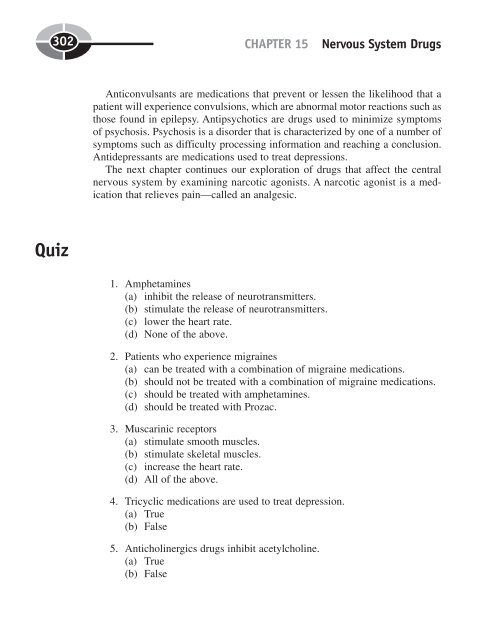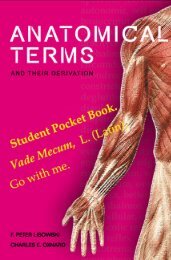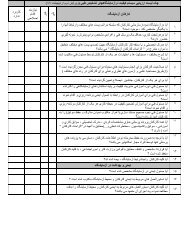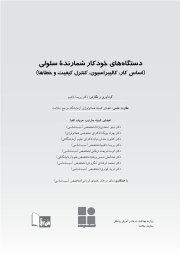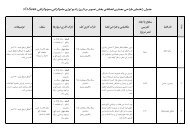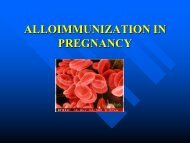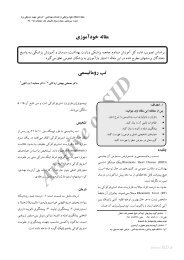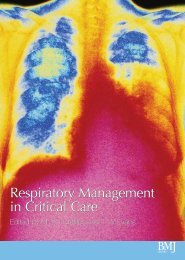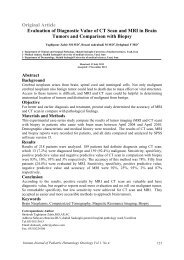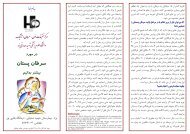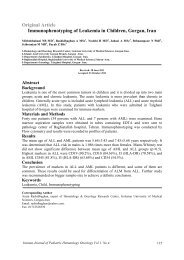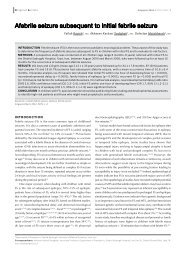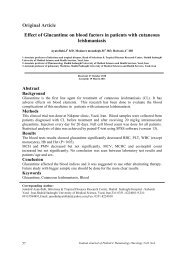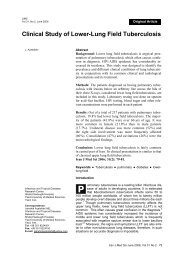- Page 2 and 3:
PHARMACOLOGY DEMYSTIFIED
- Page 4 and 5:
PHARMACOLOGY DEMYSTIFIED MARY KAMIE
- Page 6 and 7:
Professional Want to learn more? We
- Page 8 and 9:
vi CONTENTS CHAPTER 3 Pharmacology
- Page 10 and 11:
viii CONTENTS CHAPTER 9 Vitamins an
- Page 12 and 13:
x CONTENTS Tuberculosis 243 Antifun
- Page 14 and 15:
xii CONTENTS CHAPTER 22 Disorders o
- Page 16 and 17:
xiv A Look Inside INTRODUCTION Phar
- Page 18 and 19:
xvi CHAPTER 8: HERBAL THERAPY Herba
- Page 20 and 21:
xviii CHAPTER 17: IMMUNOLOGIC AGENT
- Page 22 and 23:
This page intentionally left blank
- Page 24 and 25:
This page intentionally left blank
- Page 26 and 27:
2 are prescribed; and how they are
- Page 28 and 29:
4 The Source of Drugs Ask a child w
- Page 30 and 31:
6 Drugs Names One of the most confu
- Page 32 and 33:
8 Drug Safety CHAPTER 1 An Inside L
- Page 34 and 35:
10 PHASE II: LIMITED CONTROLLED EVA
- Page 36 and 37:
12 Drug Orders CHAPTER 1 An Inside
- Page 38 and 39:
14 Table 1-1. (continued) CHAPTER 1
- Page 40 and 41:
16 TYPES OF DRUG ORDERS CHAPTER 1 A
- Page 42 and 43:
18 Healthcare providers should also
- Page 44 and 45:
20 Summary CHAPTER 1 An Inside Look
- Page 46 and 47:
22 4. Herbals are tested and regula
- Page 48 and 49:
24 Drug Actions Drug action is the
- Page 50 and 51:
26 PHARMACOKINETICS Pharmacokinetic
- Page 52 and 53:
28 molecules and a carrier must be
- Page 54 and 55:
30 CHAPTER 2 Drug Action and Drug I
- Page 56 and 57:
32 CHAPTER 2 Drug Action and Drug I
- Page 58 and 59:
34 The response time is plotted on
- Page 60 and 61:
36 Side Effects The drug’s Therap
- Page 62 and 63:
38 Summary CHAPTER 2 Drug Action an
- Page 64 and 65:
40 CHAPTER 2 Drug Action and Drug I
- Page 66 and 67:
42 The Nursing Process CHAPTER 3 Ph
- Page 68 and 69:
44 CHAPTER 3 Pharmacology and the N
- Page 70 and 71:
46 Patient information CHAPTER 3 Ph
- Page 72 and 73:
48 Some drugs such as barbiturates,
- Page 74 and 75:
50 achieve the goal statement. An i
- Page 76 and 77:
52 Impact of Cultural Influences in
- Page 78 and 79:
54 Mother and the Fetus Pediatrics
- Page 80 and 81:
56 CHAPTER 3 Pharmacology and the N
- Page 82 and 83:
58 Quiz CHAPTER 3 Pharmacology and
- Page 84 and 85:
This page intentionally left blank
- Page 86 and 87:
62 A medication is misused whenever
- Page 88 and 89:
64 For a variety of reasons, a subs
- Page 90 and 91:
66 a medication for pain creates a
- Page 92 and 93:
68 CHAPTER 4 Substance Abuse mine i
- Page 94 and 95:
70 Table 4-2. (continued) Drug Desc
- Page 96 and 97:
72 CHAPTER 4 Substance Abuse Tolera
- Page 98 and 99:
74 CHAPTER 4 Substance Abuse to an
- Page 100 and 101:
76 CHAPTER 4 Substance Abuse (dizzi
- Page 102 and 103:
78 Summary CHAPTER 4 Substance Abus
- Page 104 and 105:
80 6. Psilocybin is (a) extracted f
- Page 106 and 107:
82 The Nursing Process and Medicati
- Page 108 and 109:
84 can available when administering
- Page 110 and 111:
86 CHAPTER 5 Medication Administrat
- Page 112 and 113:
88 • Create your own medication a
- Page 114 and 115:
90 11. Instruct the patient about s
- Page 116 and 117:
92 ADMINISTERING MEDICATION AT HOME
- Page 118 and 119:
94 Summary Quiz Assessing the patie
- Page 120 and 121:
96 CHAPTER 5 Medication Administrat
- Page 122 and 123:
98 mouth but instead of ingesting t
- Page 124 and 125:
100 increasing number of drugs that
- Page 126 and 127:
102 • Instill the prescribed numb
- Page 128 and 129:
104 • Flush the tube with 30 to 5
- Page 130 and 131:
106 • Assess the patient in 24 to
- Page 132 and 133:
108 Table 6-1. Injection sites. Inj
- Page 134 and 135:
110 Summary CHAPTER 6 Route of Admi
- Page 136 and 137:
112 5. The inner aspect of the fore
- Page 138 and 139:
114 Table 7-1. Units and their equi
- Page 140 and 141:
116 Converting Metric Units Let’s
- Page 142 and 143:
118 There are two methods nurses ca
- Page 144 and 145:
120 For example, the prescriber mig
- Page 146 and 147:
122 Quiz CHAPTER 7 Dose Calculation
- Page 148 and 149:
This page intentionally left blank
- Page 150 and 151:
126 CHAPTER 8 Herbal Therapy fact t
- Page 152 and 153:
128 Herbal capsule is another commo
- Page 154 and 155:
130 After choosing a nursing diagno
- Page 156 and 157:
132 DONG QUAI (ANGELICA SINESIS) Do
- Page 158 and 159:
134 SAGE (SALVIA OFFICINALIS) Dry s
- Page 160 and 161:
136 4. Chamomile should not be take
- Page 162 and 163:
138 However, larger amounts of vita
- Page 164 and 165:
140 Table 9-1. (continued) B3 Eggs,
- Page 166 and 167:
142 CHAPTER 9 Vitamins and Minerals
- Page 168 and 169:
144 CHAPTER 9 Vitamins and Minerals
- Page 170 and 171:
146 Vitamin B Complex (continued) C
- Page 172 and 173:
148 Vitamin B 12 the transcobalamin
- Page 174 and 175:
150 Alert the patient to the signs
- Page 176 and 177:
152 Zinc Dose 12-19 mg/day Maintena
- Page 178 and 179:
154 Summary Quiz Vitamins and miner
- Page 180 and 181:
This page intentionally left blank
- Page 182 and 183:
158 Body Fluids Electrolytes Water
- Page 184 and 185:
160 IV Fluids osmolar. Hypo-osmolar
- Page 186 and 187:
162 CHAPTER 10 Fluid and Electrolyt
- Page 188 and 189:
164 • Weight (not increased). •
- Page 190 and 191:
166 • Diaphoresis. • Dialysis.
- Page 192 and 193:
168 cardiopulmonary resuscitation.
- Page 194 and 195:
170 • Read all labels on food pro
- Page 196 and 197:
172 CHAPTER 10 Fluid and Electrolyt
- Page 198 and 199:
174 CHAPTER 10 Fluid and Electrolyt
- Page 200 and 201:
176 • Administer vitamin D. • H
- Page 202 and 203:
178 Phosphorus is acquired by eatin
- Page 204 and 205:
180 Summary • Confusion. • Oste
- Page 206 and 207:
182 CHAPTER 10 Fluid and Electrolyt
- Page 208 and 209:
184 CHAPTER 11 Nutritional Support
- Page 210 and 211:
186 There are various mixtures that
- Page 212 and 213:
188 Table 11-1. (continued) CHAPTER
- Page 214 and 215:
190 • Potential for loss of skin
- Page 216 and 217:
192 The Nursing Process and Parente
- Page 218 and 219:
194 Quiz CHAPTER 11 Nutritional Sup
- Page 220 and 221:
This page intentionally left blank
- Page 222 and 223:
198 fluid and white blood cells to
- Page 224 and 225:
200 COMMON TYPES OF ARTHRITIS CHAPT
- Page 226 and 227:
202 3. Which of the following relie
- Page 228 and 229:
204 Microorganisms—A Small Formid
- Page 230 and 231:
206 4. They inhibit the bacteria’
- Page 232 and 233:
208 Otherwise, this can lead to und
- Page 234 and 235:
210 CHAPTER 13 Antimicrobials—Fig
- Page 236 and 237:
212 CHAPTER 13 Antimicrobials—Fig
- Page 238 and 239:
214 PENICILLIN AND DRUG-DRUG INTERA
- Page 240 and 241:
216 Cephalosporin can be prescribed
- Page 242 and 243:
218 CHAPTER 13 Antimicrobials—Fig
- Page 244 and 245:
220 CHAPTER 13 Antimicrobials—Fig
- Page 246 and 247:
222 MACROLIDE ANTIBIOTICS CHAPTER 1
- Page 248 and 249:
224 Macrolides and Drug-Drug Intera
- Page 250 and 251:
226 Here are the common nursing dia
- Page 252 and 253:
228 • Ethacrynate parenteral [Ede
- Page 254 and 255:
230 CHAPTER 13 Antimicrobials—Fig
- Page 256 and 257:
232 TETRACYCLINES CHAPTER 13 Antimi
- Page 258 and 259:
234 Tetracyclines, Nursing Diagnosi
- Page 260 and 261:
236 Chloramphenicol and Drug-Drug I
- Page 262 and 263:
238 Fluoroquinolones and Drug-Drug
- Page 264 and 265:
240 CHAPTER 13 Antimicrobials—Fig
- Page 266 and 267:
242 CHAPTER 13 Antimicrobials—Fig
- Page 268 and 269:
244 CHAPTER 13 Antimicrobials—Fig
- Page 270 and 271:
246 CHAPTER 13 Antimicrobials—Fig
- Page 272 and 273:
248 Anthelmintic CHAPTER 13 Antimic
- Page 274 and 275:
250 Summary CHAPTER 13 Antimicrobia
- Page 276 and 277: 252 3. Antibiotics fight off bacter
- Page 278 and 279: 254 The respiratory tract is divide
- Page 280 and 281: 256 TRACHEOBRONCHIAL TUBE The trach
- Page 282 and 283: 258 gestants—especially nasal spr
- Page 284 and 285: 260 ACUTE PHARYNGITIS Acute pharyng
- Page 286 and 287: 262 disease. More than 1 1 /2 billi
- Page 288 and 289: 264 leukotrienes inhibit the action
- Page 290 and 291: 266 Summary CHAPTER 14 Respiratory
- Page 292 and 293: 268 7. Constriction of the bronchio
- Page 294 and 295: 270 iology of the system. The nervo
- Page 296 and 297: 272 analeptics are benzphetamine (D
- Page 298 and 299: 274 CHAPTER 15 Nervous System Drugs
- Page 300 and 301: 276 Other Barbiturates (continued)
- Page 302 and 303: 278 Commonly administered intraveno
- Page 304 and 305: 280 Other Local Anesthetic Agents L
- Page 306 and 307: 282 Receptor Physiologic responses
- Page 308 and 309: 284 CHAPTER 15 Nervous System Drugs
- Page 310 and 311: 286 CHAPTER 15 Nervous System Drugs
- Page 312 and 313: 288 Anticholinergics drugs block pa
- Page 314 and 315: 290 Centrally acting muscle relaxan
- Page 316 and 317: 292 CHAPTER 15 Nervous System Drugs
- Page 318 and 319: 294 types of seizures defined by th
- Page 320 and 321: 296 Atypical antipsychotic drugs ar
- Page 322 and 323: 298 There are three types of depres
- Page 324 and 325: 300 Table 15-3. Side effects of ant
- Page 328 and 329: This page intentionally left blank
- Page 330 and 331: 306 CHAPTER 16 Narcotic Agonists Fo
- Page 332 and 333: 308 Pain Assessment Pain is classif
- Page 334 and 335: 310 NARCOTIC ANALGESICS Narcotic an
- Page 336 and 337: 312 Quiz Pharmacological pain treat
- Page 338 and 339: This page intentionally left blank
- Page 340 and 341: 316 and cells from transplant donor
- Page 342 and 343: 318 CHAPTER 17 Immunologic Agents T
- Page 344 and 345: 320 A list of drugs utilized in the
- Page 346 and 347: 322 also be acquired from a pool of
- Page 348 and 349: 324 • If more than one vaccine is
- Page 350 and 351: 326 Quiz 1. The immune system is ab
- Page 352 and 353: This page intentionally left blank
- Page 354 and 355: 330 esophagus, stomach, small intes
- Page 356 and 357: 332 If nonpharmacological measures
- Page 358 and 359: 334 Glucocorticoids Glucocorticoids
- Page 360 and 361: 336 CHAPTER 18 Gastrointestinal Sys
- Page 362 and 363: 338 There are four types of laxativ
- Page 364 and 365: 340 Emollients Emollients (surfacta
- Page 366 and 367: 342 Anticholinergic Anticholinergic
- Page 368 and 369: 344 Summary CHAPTER 18 Gastrointest
- Page 370 and 371: 346 CHAPTER 18 Gastrointestinal Sys
- Page 372 and 373: 348 blood to cells and absorb waste
- Page 374 and 375: 350 Plasma contains glucose, protei
- Page 376 and 377:
352 2. Unstable (preinfarction). Un
- Page 378 and 379:
354 CHAPTER 19 Cardiac Circulatory
- Page 380 and 381:
356 • Stress. • Diet. • Exces
- Page 382 and 383:
358 Angiotensin antagonists Drugs i
- Page 384 and 385:
360 Most sodium and water reabsorpt
- Page 386 and 387:
362 CHAPTER 19 Cardiac Circulatory
- Page 388 and 389:
364 Caution should be used with pat
- Page 390 and 391:
366 Thrombolytics When a blood clot
- Page 392 and 393:
368 and triglycerides and contribut
- Page 394 and 395:
370 Quiz CHAPTER 19 Cardiac Circula
- Page 396 and 397:
This page intentionally left blank
- Page 398 and 399:
374 Skin Disorders Epidermal cells
- Page 400 and 401:
376 hands, knees, and soles of the
- Page 402 and 403:
378 At the first sign of contact de
- Page 404 and 405:
380 Severe febrile illnesses, pregn
- Page 406 and 407:
382 Summary (Sulfamylon), silver su
- Page 408 and 409:
384 3. Contact dermatitis is caused
- Page 410 and 411:
386 Table 21-1. Endocrine glands an
- Page 412 and 413:
388 CHAPTER 21 Endocrine Medication
- Page 414 and 415:
390 of the eyelids and face, thick
- Page 416 and 417:
392 insulin secretion from the beta
- Page 418 and 419:
394 areas than when given in the th
- Page 420 and 421:
396 Summary Thiazolidinediones such
- Page 422 and 423:
398 4. Glucocorticoids therapy is u
- Page 424 and 425:
400 GLAUCOMA The eye is under const
- Page 426 and 427:
402 Eye Medication CHAPTER 22 Disor
- Page 428 and 429:
404 Table 22-1. Ophthalmic medicati
- Page 430 and 431:
406 Common ear disorders are cerume
- Page 432 and 433:
408 Patient Education for Ear Medic
- Page 434 and 435:
410 CHAPTER 22 Disorders of the Eye
- Page 436 and 437:
412 5. Peppermint may relieve migra
- Page 438 and 439:
414 20. An undesired outcome of a m
- Page 440 and 441:
416 35. Order: Duricef 0.4g On hand
- Page 442 and 443:
418 50. NNRTs arrests the progressi
- Page 444 and 445:
420 64. Antibiotics fight off virus
- Page 446 and 447:
422 79. A pregnant patient tells th
- Page 448 and 449:
424 93. Spinach is a source of iron
- Page 450 and 451:
426 CHAPTER 3 1. b 2. b 3. d 4. b 5
- Page 452 and 453:
428 CHAPTER 17 1. c 2. a 3. d 4. a
- Page 454 and 455:
This page intentionally left blank
- Page 456 and 457:
432 CHAPTER 14: Respiratory Disease
- Page 458 and 459:
434 CHAPTER 17: Immunologic Agents
- Page 460 and 461:
This page intentionally left blank
- Page 462 and 463:
438 Aloe vera (Aloe barbadensis), 1
- Page 464 and 465:
440 Basics of pharmacology (Continu
- Page 466 and 467:
442 Chronic obstructive pulmonary d
- Page 468 and 469:
444 Drug action and drug interactio
- Page 470 and 471:
446 G Galantamine (Reminyl), 292292
- Page 472 and 473:
448 Iontophoresis, 279t Ipratropium
- Page 474 and 475:
450 Narcotics, controlling, 93 Naso
- Page 476 and 477:
452 Pharmaceutic phase, 24-25, 25t
- Page 478 and 479:
454 Route of medication administrat
- Page 480 and 481:
456 Trimipramine (Surmontil), 299t


